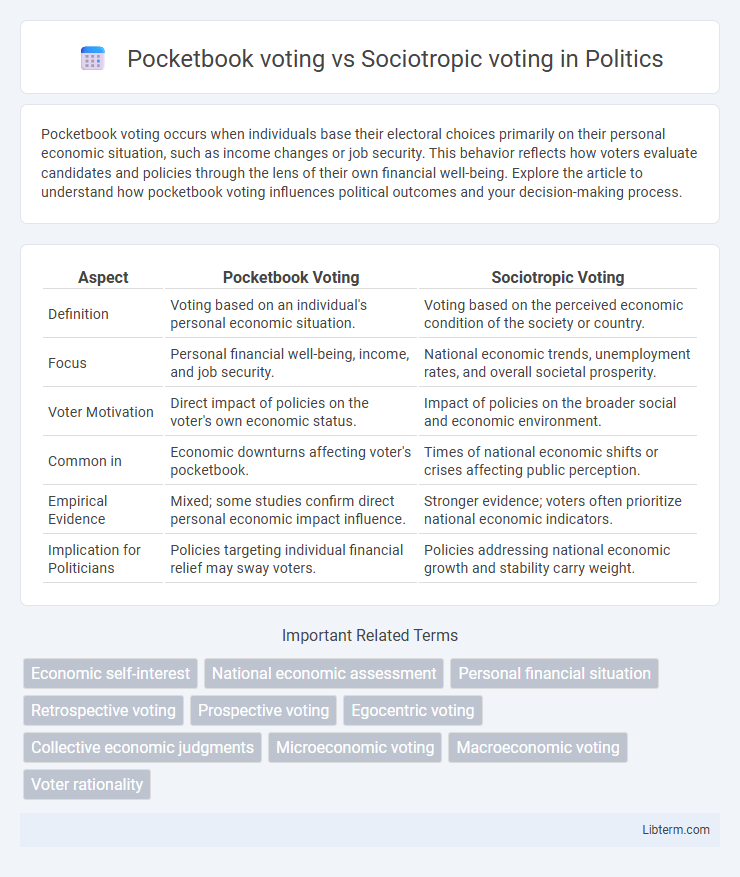Pocketbook voting occurs when individuals base their electoral choices primarily on their personal economic situation, such as income changes or job security. This behavior reflects how voters evaluate candidates and policies through the lens of their own financial well-being. Explore the article to understand how pocketbook voting influences political outcomes and your decision-making process.
Table of Comparison
| Aspect | Pocketbook Voting | Sociotropic Voting |
|---|---|---|
| Definition | Voting based on an individual's personal economic situation. | Voting based on the perceived economic condition of the society or country. |
| Focus | Personal financial well-being, income, and job security. | National economic trends, unemployment rates, and overall societal prosperity. |
| Voter Motivation | Direct impact of policies on the voter's own economic status. | Impact of policies on the broader social and economic environment. |
| Common in | Economic downturns affecting voter's pocketbook. | Times of national economic shifts or crises affecting public perception. |
| Empirical Evidence | Mixed; some studies confirm direct personal economic impact influence. | Stronger evidence; voters often prioritize national economic indicators. |
| Implication for Politicians | Policies targeting individual financial relief may sway voters. | Policies addressing national economic growth and stability carry weight. |
Introduction to Pocketbook and Sociotropic Voting
Pocketbook voting occurs when individuals base their electoral choices primarily on their personal economic situation, such as income changes or job security. Sociotropic voting contrasts this by focusing on voters' perceptions of the broader national economy or societal well-being, rather than personal circumstances. These distinct voting behaviors influence how economic conditions impact political outcomes and electoral preferences.
Defining Pocketbook Voting: Personal Economic Interests
Pocketbook voting refers to individuals casting their votes based on their personal economic circumstances, such as income, employment status, and financial well-being. This behavior contrasts with sociotropic voting, where voters consider the broader national economic condition rather than just their own finances. Personal economic interests in pocketbook voting drive decisions that reflect the direct impact of government policies on an individual's financial situation.
Understanding Sociotropic Voting: National Economic Perspectives
Sociotropic voting emphasizes how voters' decisions are influenced by perceptions of the overall national economy rather than their personal financial situations. This form of voting connects political choices to broader economic indicators such as GDP growth, unemployment rates, and inflation levels, reflecting collective economic well-being. Understanding sociotropic voting requires analyzing how national economic narratives shape electoral outcomes beyond individual pocketbook effects.
Historical Context of Economic Voting Behaviors
Pocketbook voting, where individuals base their electoral choices on personal economic circumstances, emerged prominently during the Great Depression as voters held incumbents accountable for their financial well-being. Sociotropic voting, emphasizing broader national economic conditions over individual finances, gained traction amid post-World War II economic expansions and recessions, reflecting collective economic evaluations. Historically, these distinct voting behaviors illustrate how economic crises and recoveries shape voters' attribution of responsibility between personal versus national economic performance.
Key Factors Influencing Pocketbook Voting
Pocketbook voting is primarily influenced by personal economic conditions such as individual income, job security, and inflation rates directly affecting the voter's financial well-being. Voters engaging in pocketbook voting prioritize tangible factors like changes in wages, unemployment status, and cost of living when casting their ballots. This contrasts with sociotropic voting, where broader economic perceptions and national economic health hold greater importance than personal economic experiences.
Drivers and Determinants of Sociotropic Voting
Sociotropic voting is driven primarily by perceptions of the overall economic conditions and societal well-being, where voters assess national economic indicators such as inflation rates, unemployment levels, and GDP growth before deciding their vote. Determinants of sociotropic voting include media framing of economic issues, the salience of collective economic performance in public discourse, and voters' trust in political leadership to manage the economy effectively. Unlike pocketbook voters who focus on personal financial situations, sociotropic voters prioritize the impact of economic policies on the broader society and national economic health.
Empirical Evidence: Which Voting Style Prevails?
Empirical evidence from electoral studies consistently shows pocketbook voting, where voters base decisions on personal economic conditions, prevails in affluent democracies with high economic awareness. Sociotropic voting, influenced by perceptions of national economic performance, tends to dominate in countries with collective political cultures or during economic crises. Large-scale surveys like the American National Election Studies (ANES) reveal that individual economic evaluations have a stronger correlation with voting behavior compared to sociotropic assessments in stable economic environments.
Impacts on Election Outcomes and Policy Preferences
Pocketbook voting, driven by individuals' personal economic conditions, often leads to election outcomes that reflect immediate financial concerns and promote candidates with policies aimed at improving personal economic welfare. Sociotropic voting, focusing on the broader economic or social environment, influences elections by encouraging support for candidates perceived to manage national or community well-being effectively, shaping policy preferences towards collective benefits and long-term stability. The interplay between pocketbook and sociotropic voting critically impacts democratic accountability, as policymakers tailor economic strategies either to address personal hardships or to enhance overall societal prosperity.
Psychological and Social Mechanisms Behind Voting Choices
Pocketbook voting centers on individuals' personal economic conditions influencing their ballot choices, highlighting self-interest and immediate financial well-being as primary motivators. Sociotropic voting reflects concerns about the broader economic climate and social welfare, where voters prioritize national economic indicators and societal outcomes over personal benefit. Psychological mechanisms involve cognitive evaluations of economic status and future expectations, while social mechanisms encompass group identity, social influence, and collective economic perceptions shaping preferences.
Future Trends and Implications in Economic Voting
Future trends in economic voting indicate a growing emphasis on sociotropic voting, where voters focus on the overall national economy rather than personal financial situations. Advances in data analytics reveal sociotropic concerns increasingly influence electoral outcomes in developed democracies, reflecting broader economic awareness and media impact. This shift suggests political campaigns will prioritize national economic messaging, shaping policy debates and voter expectations in coming elections.
Pocketbook voting Infographic

 libterm.com
libterm.com